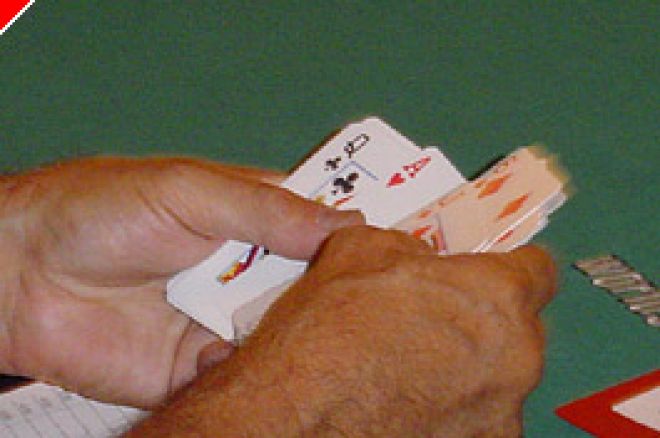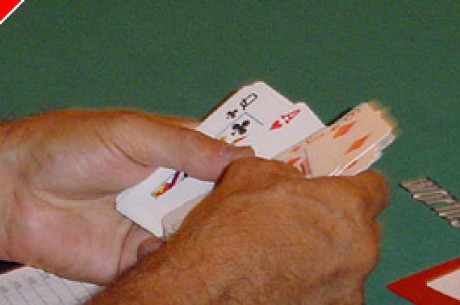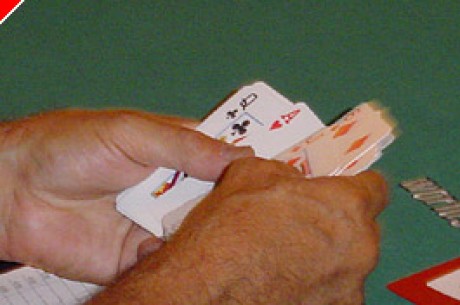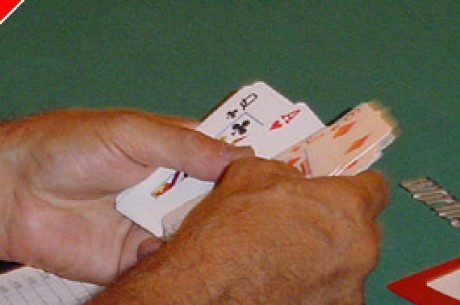Stud Poker Strategy - Death Spirals (part 1)

You've been there, I know it. If you're a serious player who plays in serious games with strangers, on line or in card rooms, you've been there. It's the bottom of the death spiral. And it isn't a pretty place.
There are all sorts of death spirals. Here's one.
After an hour or two of tight, thoughtful play, you're down to about $300 after staring with $500. You've done your best, focused your attention, tried to take advantage of situations as they've been presented to you. But the cards just weren't there. Maybe they started out strong - or maybe just scary to your opponents. But your value bets didn't pan out because your hand went south. And your bluffs and semi-bluffs failed to win you the pot. So you're down $200.
You've been at it for a couple of hours. You've had a long, long run of unplayable hands. So you've folded many hands in a row. You still think you're playing well, but you're getting a little bored and frustrated at the bad run of cards and the resulting lack of meaningful action. You decide to bust out of your tight image, at least for a hand. You've committed yourself to some aggressive play as soon as you get anything close to a playable hand.
You're dealt (8h Th)Ks. A 3d is the bring-in and is four or five to your right. She brings it in for the $3.00 and gets a caller before the action gets to you. Three players remain plus the bring-in. You decide to complete it to $10 - certainly a bit of a wild raise for you. But your Kings are fully live, no Aces are exposed and you figure you might win the antes and the bring-ins while perking up this dreadful game and changing your rocky image..
The ante steal fails. Two players call you - the bring-in with a 3d and some guy with the Js. Your King is fully live; one each of your other cards have been folded.
You get a the Qh on Fourth Street giving you (8h Th)Ks Qh. The Jack gets an 8 and the 3 gets a suited Ace. The 3h-Ah bets; the Js-8d calls and it's to you. You figure you have a Straight draw and a Flush draw and four cards that are all at least pretty high. It's still the lower tier of betting and there are two other players in. With the pot odds and your outs you figure it's a borderline call. But you haven't played many hands lately - so you convince yourself to make the call.
On Fifth Street you pair your 8 with (8h Th)KS Qh 8c. You see (xx)3d-Ah-Kd and (xx) Js-8c-Qs. The Ace is high and bets. The Jack calls. You figure that you have a shot at trips, two pair or even a straight or a flush. And it's three-way action. So you call too.
On Sixth Street you don't improve. But apparently neither do your opponents. The Ace bets, the Jack calls, and you figure that the pot is so large you're committed to calling now. On the River you catch another Ten for two pair. The Ace bets. The Jack folds. You figure that the pot odds justify a call - just in case he was bluffing. So you call and you lose Aces over Threes.
You're continuing down the death spiral. It's not that any individual decision was very wrong. But the momentum of the hand carried you toward increasingly expensive compounding mistakes. When your ante steal didn't work you should have quit. But you became improperly committed to pushing the hand until you won. And so you lost eight small bets instead of only one.
Let's face it. It's hard to admit defeat when you began as the aggressor. And yet, to win in the long run, we frequently have to do just that. If our raise on Third Street, which may have been ill conceived to begin with, doesn't work, we should check and fold on Fourth Street if we don't hit the right card. And if by Fifth Street we still haven't improved, we shouldn't just bet in an attempt to win. Sometimes a tactical retreat is the best way to halt our downward death spiral.
Ed Note: Play stud at Poker Blue without the death spirals, please.








